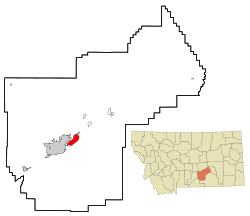Lockwood, Montana | |
|---|---|
 Emerald Hills, Lockwood | |
 Location of Lockwood, Montana, just east of Billings | |
| Coordinates: 45°49′46″N108°22′50″W / 45.82944°N 108.38056°W | |
| Country | United States |
| State | Montana |
| County | Yellowstone |
| Area | |
• Total | 13.342 sq mi (34.556 km2) |
| • Land | 12.855 sq mi (33.294 km2) |
| • Water | 0.487 sq mi (1.262 km2) |
| Elevation | 3,127 ft (953 m) |
| Population | |
• Total | 7,195 |
| 7,393 | |
| • Density | 560/sq mi (216.1/km2) |
| Time zone | UTC–7 (Mountain (MST)) |
| • Summer (DST) | UTC–6 (MDT) |
| ZIP Code | 59101 |
| Area code | 406 |
| FIPS code | 30-44200 |
| GNIS feature ID | 2408626 [2] |
| Website | lockwoodmontana.com |
Lockwood is a census-designated place (CDP) in Yellowstone County, Montana, United States. It is not an organized city or town. The population was 7,195 at the 2020 census. [3] Lockwood is a suburb of Billings and is the second largest community in the Billings Metropolitan Statistical Area. Annexation of Lockwood to Billings has been studied; however, the June 2009 Billings City Council Annexation Plan states that the city has no plans to annex Lockwood in the foreseeable future.[ citation needed ]
